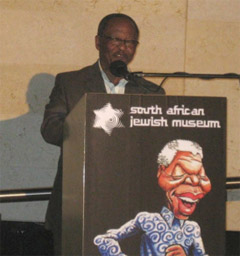Ndebele goes live

'My website is intended to be a platform for reflection on questions touching on all aspects of our exciting, complex country,' writes Ndebele, who is an associate research fellow with the Archive and Public Culture research initiative, known and valued for his crucial insights and commentary on South African public life. 'We lead our national life intertwined with the fates of other peoples of the world. What are the strands of that intertwining?'
Published on the site is a selection of his writings most of which can be found in his books Rediscovery of the Ordinary and, more recently, Fine Lines from the Box, which bring together his seminal essays on South African literature and culture. His other books include The Cry of Winnie Mandela and Fools and Other Stories, which won a Noma Award.
One of his most recent homepage updates features the stirring speech he made at the opening of the exhibition, Jiving with Madiba: Jonathan Shapiro's Mandela, in July. Not just another tribute to Nelson Mandela, this exhibition celebrates the life and contributions of South Africa's greatest citizen, his struggle, successes and shortcomings, as portrayed by this country's leading political cartoonist Jonathan Shapiro, better known as Zapiro. It runs at the Jewish Museum in Cape Town until 27 September 2011.
'The greatest threat we face is the impact on the public mind of the emergent, unconstitutional culture of concealment,' said Ndebele, in his speech, which some considered one of the most significant speeches from a public figure this year. 'The threat occurs when we no longer see corruption, unemployment, poverty, inefficiency, incompetence, entitlement for what they are, because we would have legislated them into normality through officialised mechanisms of concealment, new hurdles on the marathon run such as the government-proposed media tribunal, and the Protection of Information Bill...
'When Public Protector, Thuli Madonsela, reportedly sought spiritual counsel, she was seeking to restore her inner strength, her precious subjectivity that would enable her to stay true to her professional vocation,' said Ndebele.
'We share that subjectivity: all of us, the rich and the poor; the black and the white; man and woman; the rural and the urban; citizen and foreigner; Christian, Jew, Moslem, and Hindu; teacher and pupil; employer and worker; the robber and the robbed. Let's take it all out there, into the public domain, expose it, share it, renew it each time we do so. This is how we will give birth to honest public conversation, far from the duplicities of the moment. Much of our current politics, now old politics, draws little sustenance from the emergent subjectivities of our new country.'
To read the full speech or uncover other key reflections penned by Ndebele, visit: njabulondebele.co.za